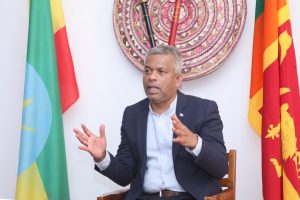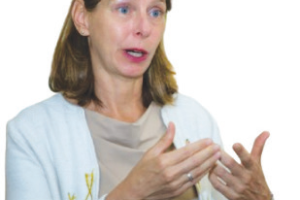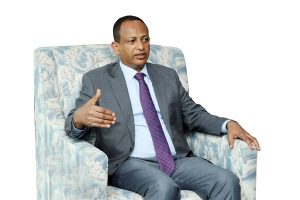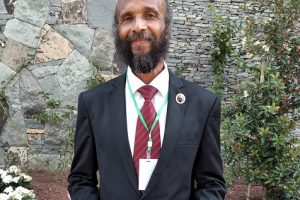
Today’s guest, Amin Elhag, was born and raised in Sudan. After high school, he traveled to the Middle East and stayed in the Gulf area for almost 25 years before deciding to return to Sudan, which unfortunately did not work out as planned.
He then left for the USA and has been living in New York for almost 25 years. He graduated from City University of New York, Brooklyn College with a degree in digital media production. He is a film director, working in both film and theater.
After the revolution in Sudan in December, he wanted to make a difference in his home country. He started some companies and organizations there, but they were all stopped when the old regime returned to power. They were involved in the same businesses he was trying to establish, such as digital and wireless phone companies and agricultural ventures. It felt like they were back to square one after the revolution.
He returned to New York and began working to support Sudan in reclaiming their revolution. Now, with war raging, he is in Addis Ababa and trying to do what he can to stop the conflict, establish a new transitional government based on freedom, peace, and justice.
During his stay with The Ethiopian Herald, Amin Elhag has raised a range of issues, including ways to ensure lasting peace in Sudan and all over Africa by strengthening continental unity and togetherness. Have a nice read!
How do you understand the current situation in Sudan?
The current situation in Sudan is dire, with a significant involvement of outsiders from neighboring countries and the region. Each of them has a vested interest in benefiting from Sudan, perpetuating the ongoing conflict. This situation will persist unless we take a decisive stand. Sudan’s appeal lies in its abundant resources such as land, rain, rivers, and wildlife, along with valuable commodities like gold. This has attracted the attention of surrounding nations, fueling the conflict as everyone seeks to exploit Sudan for their gain.
The absence of a functioning government has left borders porous, allowing anyone to enter, exploit resources, and depart without repercussions. I am here to advocate for Sudan, establish a stable government, secure our borders, and ensure that we reap the benefits of our natural wealth. In the past, under al-Bashir’s regime, other countries have exploited our resources, claiming them as their own. It is imperative that we rebuild Sudan and create a new future for our nation.
This issue extends beyond Sudan; it is a larger African concern. The entire continent is fractured and vulnerable to exploitation by external forces. It is time for us to take a unified stand and put an end to this exploitation.
How did you come to this decision on your own?
After spending several years in New York engaging with members of the United Nations, including ambassadors and consuls, I realized that while they understood our challenges, they were limited in their ability to effect change. They expressed their constraints as employees bound by their government’s policies. This realization prompted me to return home and contemplate a solution.
I recognized that the power to effect change lies within us, as Africans, if we unite. I decided that Addis Ababa, with the African Union headquarters and representation from all African countries, was the ideal platform for collaboration and collective action.
How can we solve African problems with African solutions using this principle?
The issue is that the AU is currently dysfunctional and unable to resolve anything. For instance, the war in Sudan has been ongoing for two years without any resolution. This lack of action is not only limited to Sudan but also extends to Somalia and other countries. To tackle the issues in Sudan and across Africa, we must first reform the AU.
The AU has the potential to be effective, but it needs to be restructured to become more objective and powerful. Merely issuing statements of condemnation or regret is not sufficient. Action is necessary to make progress.
To kick start change, I intend to visit Addis Ababa to meet with His Excellency, the Prime Minister, Abiy Ahmed (PhD). I have already submitted a request to his office and am awaiting a response. I believe that he has the capability to lead the path towards peace in Africa, as demonstrated by his recent involvement in a peace conference.
In order to take action, we must reform the AU and address the issues afflicting Africa, starting with Sudan. By standing together as 54 countries, we have the potential to put an end to conflicts and establish new nations. This process will entail new regulations and laws to guide our actions.
The ultimate objective is to create a unified nation that transcends borders and encompasses all nations, not just those in Africa. However, certain conditions must be met to join this new organization, including being a free and civilian-led country.
Once a country becomes a part of this new nation, they commit to collaborating in all aspects of governance, including military, economic, political, and social matters. This unity will ensure that member nations support each other during times of crisis, preventing military coups and other disruptions to stability.
By uniting in this manner, we can build a stronger, more unified front that can address issues on a global scale. The key to success lies in meeting the requirements for membership and embracing a shared vision of unity and cooperation.
AU is undergoing reform. What is the reflection you have in that?
With regards to AU reform, I believe it is currently underway. Many people are discussing it, but so far, no action has been taken. Meetings are still ongoing, and individuals are constantly traveling to and from these meetings. This lack of progress is frustrating, and we need to see tangible actions being taken towards reform.
Why are we waiting? The conflict in Sudan has been going on for two years, and nothing has been done. It’s time to take action and shake up the AU. The current system is not working, and it is broken due to the existing laws. We need to simplify and unite in order to make progress.
If we come together as one, any issue affecting one country will not impact us all. We are like one big house, with each country living in a room. If something happens in one room, it will affect the entire house. We cannot afford to wait for problems to come to us; we must address them collectively.
When a problem arises in Sudan or Somalia, we should all come together to find a solution. However, if we continue to remain divided and only focus on meetings and travel, conflicts will continue to spread across Africa. We need to speak with one voice as 54 united countries in order to demand change and reclaim our heritage and history.
There is a story that illustrates this point well. An old man gave each of his sons a stick and asked them to break it, which they did easily. Then he gave them a bundle of sticks and asked them to break it together, which they could not. He explained that if they stayed united, they would be unbreakable.
It is time for us to follow this example and work together as one cohesive unit. Let’s stop waiting and start taking action towards reforming the AU.
Let’s revisit the issue of Sudan. I believe that individuals, like you, can contribute to ensuring peace in Sudan, correct? So, what advice do you have for people in general?
People like me, there are many. I am just a simple man. While there is a lot of effort being made, each person has their own way, which is not easy. It’s challenging because the people are now at the forefront, fighting. Individuals scattered around the world have their reasons and voices.
Some fight through writing, some through street demonstrations, and some by organizing aid for displaced individuals. Each person has their own tools. My tools are different. I feel the need to take direct action and make a change, to try to do something. People like me, millions scattered around the world, are trying to assist their own people who have been displaced from their homes, including the sick and children. Some people like me are sick and in need of help, services, doctors, and medicines. In some places, people like me find it difficult to raise their voices.
Everyone has their reasons, and of course, you can only see those who are actively fighting and have all the tools to go to the media and represent themselves. These individuals currently in the spotlight, in the media, are discussing resolving the problem, but they are not the right ones to do so because they are the ones who destroyed Sudan.
Anyone who destroys their country will never be able to rebuild it. Never! Those individuals are killing Sudan, demolishing Sudan. They cannot rebuild Sudan. Sudan will be rebuilt by the simple people who are all around, who have no allegiance to any party. This is not the time for parties. No. Our December revolution is being undermined because they lack the proper plan on how to proceed, and the entrenched regime in the government is succeeding in returning and taking over. Those other individuals currently in the spotlight are irrelevant. The new Sudan will be built by the people, simple people who are displaced, living outside Sudan, and the simple people who love Sudan.
If you love your country, you will not destroy it. If I have an issue with you, I do not have to resort to violence. Unfortunately, this is happening because they disagree with each other; they kill each other. This is not the democratic way. If you have your opinion, I have mine. We sit down at the table and discuss. We are different, yes, but that is democracy. We must embrace our differences; we cannot all agree. You have your own view; I have mine that is democracy. We sit down and talk, but what they are doing is killing each other.
Therefore, they are irrelevant. The honest Sudanese people all around initiated this transitional civilian government to lift Sudan from the ground and begin rebuilding everything that has been destroyed, including hospitals, schools, government institutions, and everything else.
We need to reconstruct the system; we lack a system, laws, or constitution to build upon. All of this must be established, and then, elections will follow. Of course, there is no democracy without elections, without political parties, but not now. This is the time to reconstruct the new Sudan, and the new Sudan will be different. We are going to change the name.
I propose calling it the United States of Sudan, and hopefully, everyone will agree with me. It will be the United States of Sudan because our issues were all centered in Khartoum, neglecting the other states. Now, we will delegate power to the states, allowing each state to govern itself with a small government. The government in Khartoum will have limited authority, which is a common issue in many African countries where everything is centralized in the capital.
It will resemble a federal system with states, and each state will have its own government. I will not need to worry about what streets to build in Khartoum for Sudan. The people in Sudan know best, so when we have a government in each state, they can handle their affairs, and I will oversee matters from the central government in Khartoum. This will be the United States of Sudan, Inshallah. We will return power to the states to govern and build as they see fit. This is not just for Sudan; this is my wish for all of Africa, to be developed with freedom, peace, and justice.
As someone from an art background or a filmmaker, how can art play a significant role in ensuring peace in Sudan and elsewhere in Africa?
For Sudan, art or filmmaking is something that always makes you dream about how to make a change, but it takes time. As a filmmaker, I want everything in Sudan to be okay, but it takes time because filmmaking, for me now, is a kind of luxury. This is not the time to make films; it’s the time to lay the foundation so that in the future, we can make films.
Filmmaking requires a lot of resources, and we don’t have them. We don’t even have enough food to eat, so I cannot make a film. I need safety, food, education, resources, and infrastructure to make a film. Without these things, how can I make a film? So, for now, I focus on how to rebuild Sudan and help Africa.
My film aims to make a change in the world, and the tools to do so are simple. If we stand together, we can make a change. The UN and AU are not doing enough, so we must stand up as Africa and take action. It’s time to create a new organization that is not hindered by vetoes and can truly make a difference.
To join this new organization, countries must be free and willing to share resources and help each other. By working together as one nation, we can solve any problem and create a better future for all of Africa. This is why I have come to Addis Ababa, to unite with other African countries and leaders like Prime Minister Dr. Abiy Ahmed to work towards peace and reform.
The media in Addis Ababa, Ethiopia, must also stand up and take action to support this cause. Together, we can make a change and lead the AU to become a unified force for good in Africa and beyond. By working together and investing in our own land and resources, we can create a better future for all Africans and show the world the power of unity and collaboration.
Thank you very much. These are the question prepared for you for today.
It is my pleasure.
BY GIRMACHEW GASHAW
THE ETHIOPIAN HERALD SATURDAY 7 DECEMBER 2024




